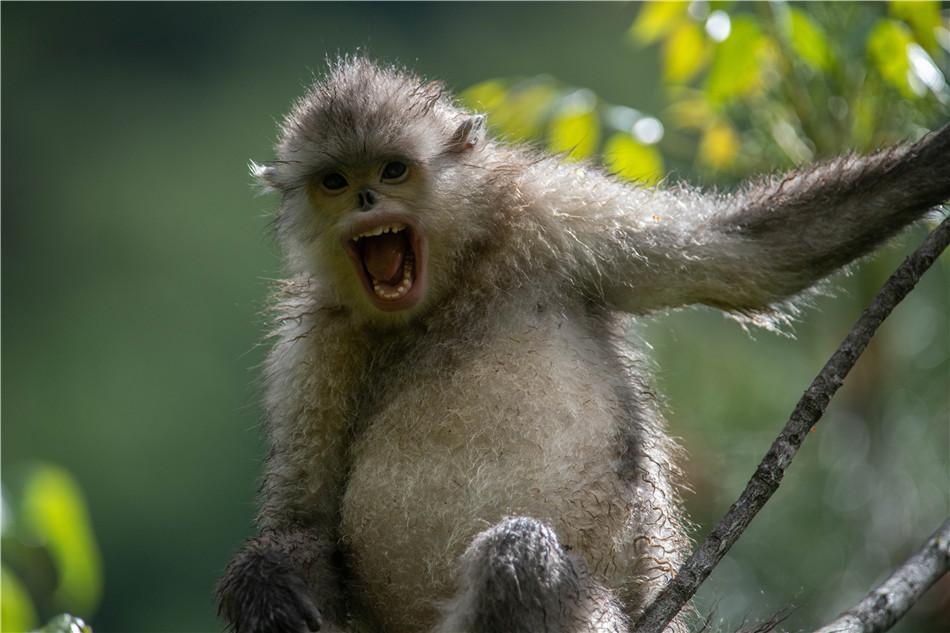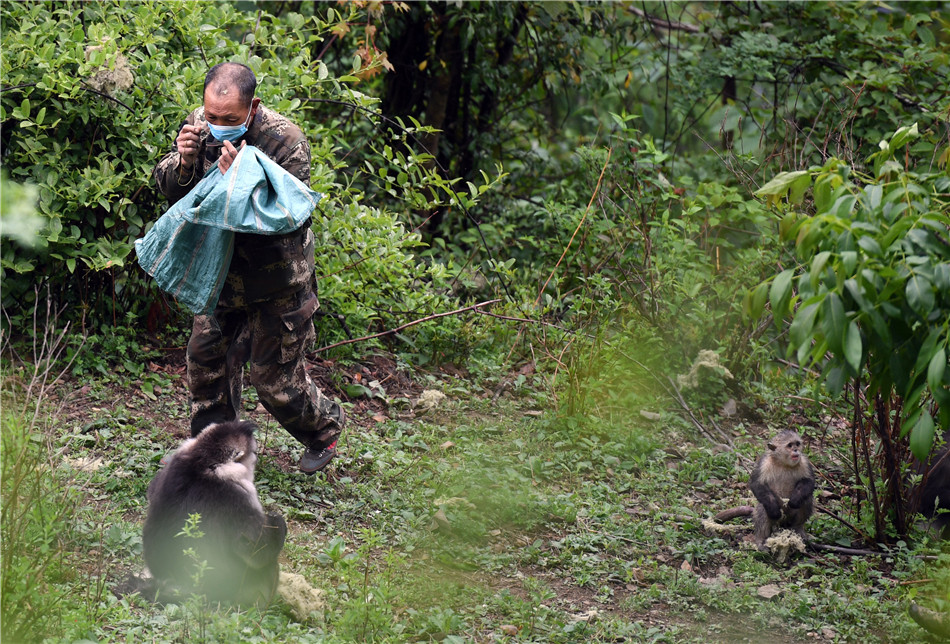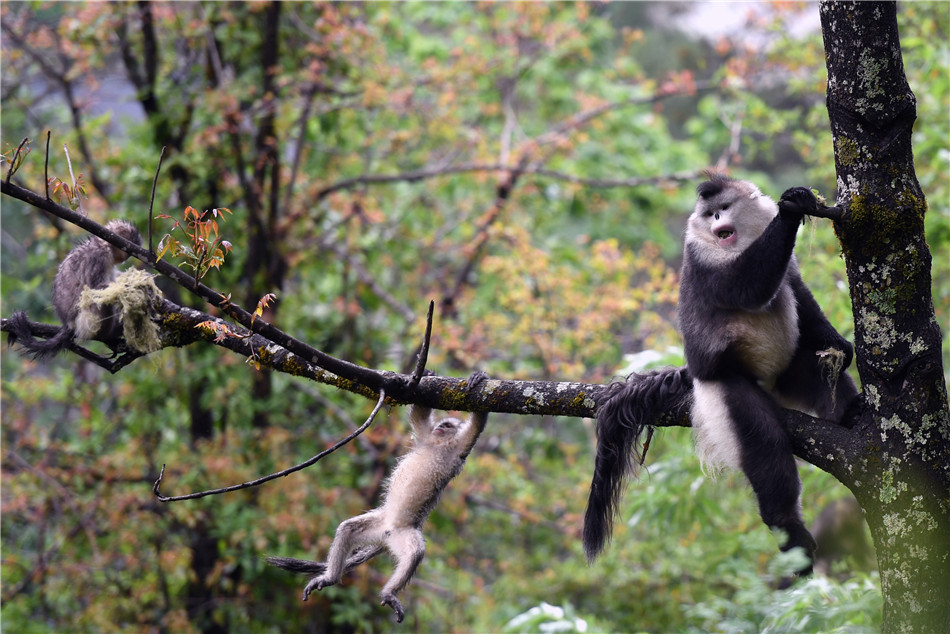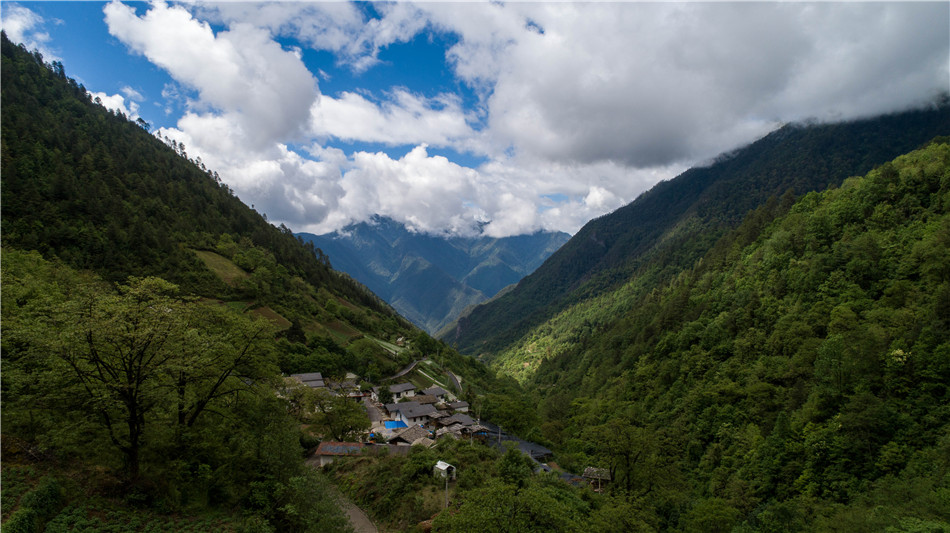As the clock strikes 9 a.m., Yu Xiaode trudges through the lush forest of the nature reserve to visit his forest friends with exquisitely-prepared breakfast and special treats of the day: in-shell peanuts, pumpkin seeds, corn and dried apples.

With the blow of a whistle, his friends -- troops of black-and-white snub-nosed monkeys, also known as Yunnan golden hair monkeys, one of the world's most endangered species, would jump down from the trees, surround Yu, pick up the usnea lichen cast by him and savor their breakfast.
The mountainous forests of southwest China's Yunnan Province and neighboring Tibet Autonomous Region are the habitat of these monkeys, with most living in the Baima Snow Mountain National Nature Reserve.
As Yu continued his tread, he noticed two monkeys bicker all of a sudden. Yu stopped upon hearing the jabbers, reproaching at the two; the monkeys then got separated and headed to the forests, respectively.

Yu, 63, a forest ranger in Baima Snow Mountain National Nature Reserve in the Deqen Tibetan Autonomous Prefecture in Yunnan, stared at the monkeys attentively, unable to hide his joy and pride.
"The food we have prepared for them is an important supplement, and they need to obtain some other food in the mountains by themselves," Yu said as he tied the bag containing dinner prepared for the monkeys, adding that monkeys won't come to rob food because they are well-behaved.
According to Yu, besides feeding them, he often comes to the woods to replenish the water. He also rushes over to rescue and tend the monkeys when they get injured.
He has traveled almost every inch of the area over the past 12 years.

As a result of his continuous efforts, he has cultivated an ability to make discerning judgments about the monkeys even at a glance from afar.
Yu knows the temperament and family status of each monkey. He even named alpha males of monkey troops and mentioned each monkey with great familiarity.
"This is 'Dagezi,' whose group has two female monkeys, five juvenile monkeys, and two infant monkeys," he said. Through the years, the monkeys have lived in nearby forests and mountains and have developed a great rapport with Yu. As long as they heard his voice, they would run towards him.
The monkeys not only understand his whistles and words; they also dare to have fun near him.
Getting the hang of caring for the monkeys, getting along with them, or even befriending the monkeys, back up his pride.

Yu knows the secrets of making friends with monkeys. "We protect nature and get on well with monkeys like we are friends. The longer we get on, the closer we would become," said Yu.
"If we cut down the trees and hunt like before, we and our future generations would face the consequences," he said.
In around the 1980s, hunting and logging inflicted damage to the habitats of the monkeys, posing threats to their survival.
"Back then, there were fewer woods and bare mountains that led to food reduction and depletion in the number of monkeys. It was rare to see monkeys and they would run away immediately when they heard people's voice," Yu recalled, believing that the lesson is profound and the loss is substantial.
In 1983, China established the reserve to save the endangered monkeys. Their number has since risen to around 3,000 nationally thanks to the joint efforts of the government, researchers and local villagers, according to Lai Jiandong with the reserve.
The reserve also put concerted efforts with relevant parties to develop a management mode focusing on not only protecting the monkeys but also on bolstering the survival and development of nearby residents.

The reserve employed the local residents as forest rangers. Yu, one of them, earns around 1,800 yuan (about 254 U.S. dollars) a month, and his family of four has a total annual income of 40,000 yuan, with which his family can afford a decent life.
By the end of 2019, nearly 17,000 villagers in Deqen had been hired as government-paid forest rangers through ecological poverty-relief programs.
Yu is living a happy and rewarding life. In his spare time, he takes care of orchids in his yard in the reserve. "We should protect the environment with dedicated efforts so as to leave lucid waters and lush mountains to our future generations," said Yu.
|










7740f3b5-9ecb-438e-9052-76cb2d4bb671.jpg)

